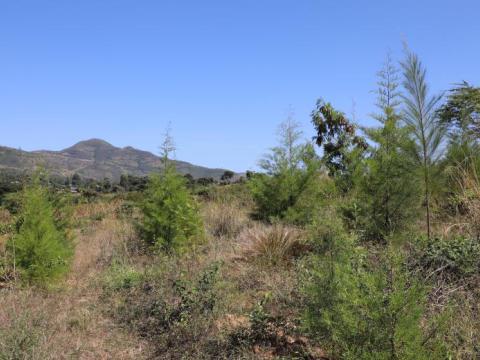Reviving Lives through Soil and Water Conservation

In the West Hararghe zone, Oromia, Nejash Hussain, a dedicated father and farmer in Gadisa village, faced a dire situation as his farmland, vital for his family’s survival, faced the threat of failure due to erratic rainfall and persistent flooding over six years. Shifting from farming to daily labour in road construction projects, Nejash encountered uncertainty in his effort to provide for his family.
Two years ago, a ray of hope emerged through the Productive Safety Net Program (PSNP) intervention, with its Public Work participants engaging in soil and water conservation near Nejash’s farmland. This initiative, supported by the USAID-backed Strengthen PSNP Institutions and Resilience II (SPIR II) programme, covered 50 hectares, witnessing the revitalisation of Nejash's land and the restoration of three vital springs, now providing clean water for the community. Taking a bold step this year, Nejash planted maize and sorghum on his rehabilitated land, achieving a bountiful harvest. Inspired by PSNP participants he aspired to cultivate further and provide the best for his children’s upbringing, eagerly learning and planning to cultivate his backyard with fruit trees and vegetables.
In 2023, SPIR II facilitated the rehabilitation of 5,448 hectares of communal land by engaging over 416,000 PSNP Public Workers in the Amhara and Oromia regions of Ethiopia. The initiative aims to enhance environmental stability and sustainable agriculture by safeguarding degraded land from human and livestock interference. Additionally, assisted natural regeneration and enrichment planting rehabilitated 17,158 hectares of communal and private lands. SPIR II’s comprehensive approach, including compost preparation, manuring, and the planting of 16 million tree seedlings, serves as biological soil and water conservation stabilisers, contributing significantly to improved ecosystem services in communal areas, and fostering a resilient and sustainable future.
Similarly facing economic challenges, Aliyu Ismael, resided in a nearby village of Hidha Dima and became a PSNP participant, offering a glimmer of hope. Earlier this year, experts identified Aliyu’s degraded farmland for soil and water conservation, providing him a second chance at cultivation. Planting elephant grass, an essential forage crop, Aliyu now earns £500 (US$9) weekly from grass sales, expanding his livelihood options. He invested in two cows, inspiring other farmers to invest in forage plants, creating a positive ripple effect. Aliyu’s daughter, Senbontu, now benefits from an improved family income, receiving essential school supplies and aspiring to become a teacher.
The 2023 World Soil Day Celebration, scheduled for 5th December, focuses on the theme "Soil and Water, a Source of Life." It aims to spotlight the inseparable connection between soil and water, emphasising their critical role in sustaining life on Earth. The event seeks to raise awareness about responsible soil and water management, underscoring their significance in supporting agriculture, ecosystems, and human well-being. By advocating for practices that promote conservation, prevent erosion, and enhance the overall health of these vital resources, the celebration encourages global efforts towards sustainable environmental practices. Ultimately, the 2023 World Soil Day Celebration serves as a collective platform for individuals, communities, and organisations to contribute to the preservation of soil and water as the foundation of life.
About SPIR II
Strengthen Productive Safety Net Program (PSNP) Institutions and Resilience (SPIR) II is a five-year Resilience Food Security Activity (RFSA) implemented by a consortium of partners led by World Vision that includes CARE, ORDA, and learning partner IFPRI. It is powered by funding from the USAID Bureau for Humanitarian Assistance (BHA), which focuses on enhancing livelihoods and resilience to shocks and improving food security and nutrition for rural households in Ethiopia’s Amhara and Oromia regions through interventions aligned with the government’s Productive Safety Net Program (PSNP).
By Emnet Dereje, Communications Specialist (SPIR II), World Vision Ethiopia